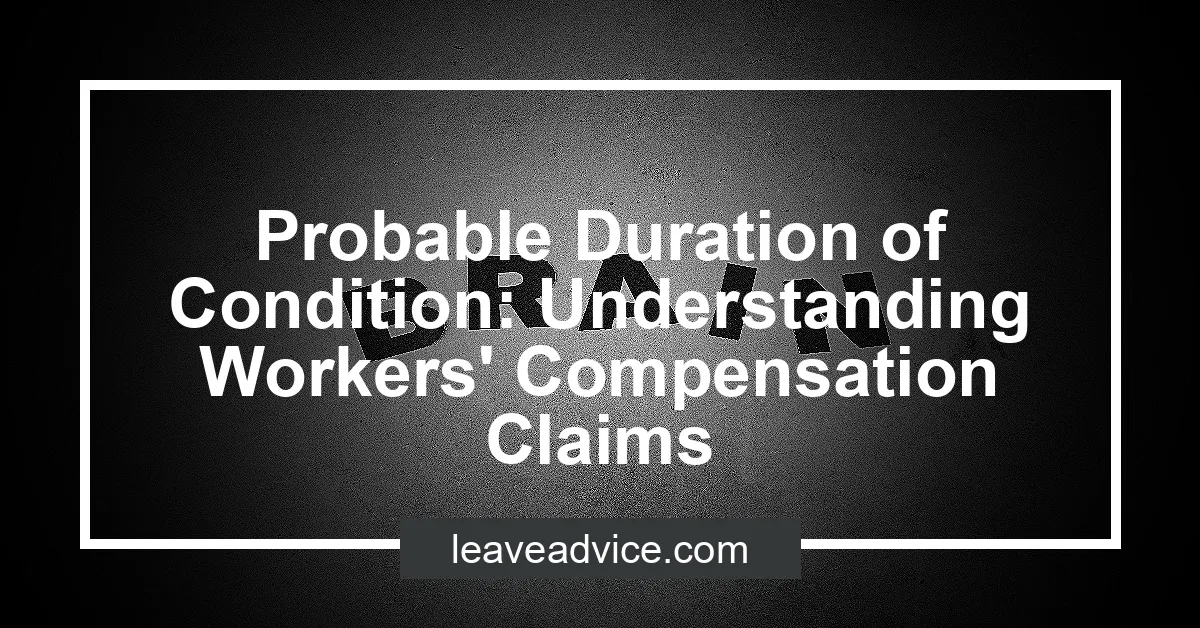Probable Duration of Condition: Understanding Workers’ Compensation Claims
Probable duration of condition refers to the estimated length of time an injured worker will require medical treatment, rehabilitation, and recovery after an on-the-job injury. This information is important in workers’ compensation claims as it helps determine the amount of benefits the injured worker may be entitled to receive.
The Role of Probable Duration of Condition in Workers’ Compensation Claims
The probable duration of condition is a crucial factor in determining a worker’s eligibility for workers’ compensation benefits. These benefits include coverage for medical treatment, lost wages, and rehabilitation costs.
The length of time the worker is expected to be away from work also affects the calculation of benefits, including disability payments. The probable duration of condition is typically estimated by medical professionals, such as physicians and physical therapists, and is based on the severity of the injury and the potential for recovery.
Documentation Needed to Support Probable Duration of Condition
Several documents are required to support the probable duration of condition in workers’ compensation claims. The injured worker will need to provide medical reports, including diagnostic tests, surgical procedures, and treatment plans.
Understanding Probable Duration of Condition
Probable duration of condition refers to the expected length of time that a medical condition or injury will last. It is important to understand the probable duration of your condition to ensure proper care and management of your injury or illness.
Factors affecting probable duration of condition
The probable duration of a condition can be affected by various factors, including but not limited to:
- The type and severity of the injury or illness
- The age and overall health of the individual
- The accessibility and quality of medical care received
- The presence of any other medical conditions that may affect recovery
It is important to discuss probable duration of condition with your healthcare provider to have a better understanding of what to expect and how to manage your care.
Coverage of probable duration of condition in workers’ compensation claims
Probable duration of condition is an important factor in workers’ compensation claims, which provide benefits to individuals who are injured or become ill as a result of their job. The probable duration of the condition will determine the length of time that benefits may be paid out for.
It is important to work with an experienced workers’ compensation lawyer who can help ensure that your probable duration of condition is properly determined and taken into account to receive fair compensation for your injury or illness.
Process of Filing a Workers’ Compensation Claim
If you have been injured on the job, the first thing you need to do is report it to your employer. They will then provide you with the necessary paperwork to file a workers’ compensation claim.
Once you have completed the paperwork, it should be submitted to the appropriate state agency for processing.
The processing time for workers’ compensation claims varies depending on several factors, including the severity of your injury and the complexity of your case. In addition to paperwork, you may need to provide medical evidence to support your claim.
The Role of Medical Evidence on Probable Duration of Condition
Medical evidence plays a crucial role in determining the probable duration of your condition. This evidence can come from various sources, including your doctor, medical tests, and medical records.
The probable duration of your condition is the length of time it is expected to continue to affect you. This information helps to determine the amount of benefits you may be entitled to.
For example, if your condition is expected to last for several months, you may be entitled to more benefits than if it is expected to last for only a few weeks.
Additionally, as mentioned earlier, a medical report needs to be submitted by your doctor at least once every so often in order to continue receiving workers’ comp benefits for lost wages.
Implications of Probable Duration of Condition on Leave Management
The probable duration of a medical condition can have significant implications for leave management in a workplace. For instance, depending on the nature of the condition, an employee may be entitled to a certain amount of medical leave, which is often linked to the duration of the ailment.
If the probable duration of the condition is relatively short, then the employee may be able to return to their job after a brief period of absence. However, if the probable duration is longer and the employee requires a more prolonged absence, then managing their leave entitlement and ensuring their job is held for them can be a complex process.
This can be further complicated if the probable duration of the condition is indefinite. In this situation, an employee may be put on a leave of absence as a reasonable accommodation until it is clear when they will be able to return to work.
The Effect of Probable Duration of Condition on Leave Entitlements
The probable duration of a medical condition can affect the amount of leave an employee is entitled to. Under the Family Medical Leave Act, eligible employees are entitled to up to 12 weeks of job-protected unpaid leave per year for reasons related to their own medical condition or that of a family member.
If the probable duration of the condition is shorter than 12 weeks, then the employee would be able to return to work after their leave without negative implications for their job. However, if the probable duration is longer, then the employee’s job may not be held for them if they exceed their leave entitlements.
Challenges in Managing Leave Due to Indefinite Probable Duration of Condition
A common challenge employers face when managing leave is dealing with an indefinite probable duration of a medical condition. In these situations, it can be difficult to determine when an employee will be able to return to work.
In such cases, an employer may choose to offer flexible work arrangements, such as telecommuting or part-time work, to help accommodate an employee’s absence. Additionally, an employer may consider hiring temporary staff to fill in during the employee’s absence, or reassigning their duties to other employees temporarily.
Ultimately, managing leave when the probable duration of a condition is uncertain can require a case-by-case approach that takes into account the needs of the employee, the employer, and any applicable legal requirements.
Frequently Asked Questions about Probable Duration of Condition
What is probable duration of condition?
How is probable duration of condition determined?
Can the probable duration of condition change over time?
Examples of Probable Duration of Condition Cases
When it comes to workers’ compensation claims, the duration of the condition is an essential factor in determining compensation and benefits. Here are some examples of real-life cases with varying probable duration of condition:
Case 1: Short-Term Injury
John slipped and fell from a ladder while changing a light bulb in the office. He immediately reported the incident, and after a medical examination, it was found that he sustained a sprained ankle.
The probable duration of John’s condition was six weeks, and he was prescribed a cast and medication. After six weeks, John returned to work without any issues.
Because John’s injury was short-term and did not require any long-term treatment, he received a lump-sum payment as compensation for his medical expenses and lost wages.
Case 2: Long-Term Injury
Susan is a machine operator in a manufacturing plant. She developed carpal tunnel syndrome as a result of repetitive stress from her job duties.
Susan’s doctor determined that her condition would likely require her to miss six months of work while undergoing physical therapy and surgery. After her surgery, Susan was still unable to perform her job duties, leading to her employer terminating her employment.
As a result, Susan was awarded workers’ compensation benefits that included payment for her medical expenses and lost wages for the duration of her condition.
Lessons Learned
These cases illustrate the importance of timely reporting and medical attention for workplace injuries and conditions. They also highlight how the probable duration of the condition affects the types of compensation and benefits that injured employees can receive.
It is crucial for employees to understand their rights and to seek legal advice from worker’s compensation lawyers to ensure that they receive the appropriate compensation and benefits for their injuries.

The Role of Workers’ Compensation Lawyers in Probable Duration of Condition Claims
When an employee sustains an injury on the job, they may be entitled to worker’s compensation benefits. Often, the duration of the injury is unclear, leaving the employee with a lot of questions and concerns.
In situations like these, an experienced workers’ compensation lawyer can assist the employee in navigating probable duration of condition claims.
Workers’ compensation lawyers can help injured employees understand the paperwork and documentation required to file a claim. They can also assist the employee in obtaining medical evidence that supports the claim, including documentation about the probable duration of the condition.
This information is crucial when seeking a fair compensation package for injuries that may have a long-term impact on the employee’s ability to work.
Furthermore, an attorney can communicate with the workers’ compensation insurer on behalf of the employee to negotiate a fair settlement. If a hearing is necessary, the lawyer can represent the employee and present medical evidence and other documentation to support the claim.
In cases where the employee requires an indefinite leave of absence as a reasonable accommodation, a workers’ compensation lawyer can assist in negotiating this accommodation with the employer. This could include exploring different scheduling options, minimizing labor costs, and identifying other reasonable accommodations that can support the employee’s return to work when possible.
It is crucial for injured employees to receive fair compensation for their injuries, especially when the condition has an uncertain and potentially long duration. Workers’ compensation lawyers play a critical role in ensuring that the rights of injured employees are protected and that they receive the compensation they deserve.
Conclusion
When it comes to workers’ compensation claims, knowing the probable duration of the condition is crucial. Injured workers should submit medical reports regularly to receive benefits for lost wages.
If the condition requires extended care, patients should receive treatment from a healthcare professional while being hospitalized. It is also recommended that individuals hire a workers’ compensation attorney who can represent them during the entire legal process.
Leaves of absence may be required as a reasonable accommodation, and some states may limit the length of time an injured worker can receive temporary benefits. By being aware of these key points, workers can ensure they receive the appropriate compensation and care they deserve.

